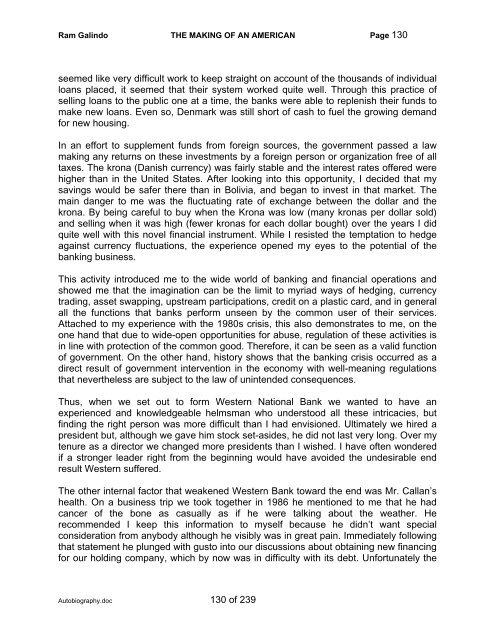Autobiography - The Galindo Group
Autobiography - The Galindo Group
Autobiography - The Galindo Group
You also want an ePaper? Increase the reach of your titles
YUMPU automatically turns print PDFs into web optimized ePapers that Google loves.
Ram <strong>Galindo</strong> THE MAKING OF AN AMERICAN Page 130<br />
seemed like very difficult work to keep straight on account of the thousands of individual<br />
loans placed, it seemed that their system worked quite well. Through this practice of<br />
selling loans to the public one at a time, the banks were able to replenish their funds to<br />
make new loans. Even so, Denmark was still short of cash to fuel the growing demand<br />
for new housing.<br />
In an effort to supplement funds from foreign sources, the government passed a law<br />
making any returns on these investments by a foreign person or organization free of all<br />
taxes. <strong>The</strong> krona (Danish currency) was fairly stable and the interest rates offered were<br />
higher than in the United States. After looking into this opportunity, I decided that my<br />
savings would be safer there than in Bolivia, and began to invest in that market. <strong>The</strong><br />
main danger to me was the fluctuating rate of exchange between the dollar and the<br />
krona. By being careful to buy when the Krona was low (many kronas per dollar sold)<br />
and selling when it was high (fewer kronas for each dollar bought) over the years I did<br />
quite well with this novel financial instrument. While I resisted the temptation to hedge<br />
against currency fluctuations, the experience opened my eyes to the potential of the<br />
banking business.<br />
This activity introduced me to the wide world of banking and financial operations and<br />
showed me that the imagination can be the limit to myriad ways of hedging, currency<br />
trading, asset swapping, upstream participations, credit on a plastic card, and in general<br />
all the functions that banks perform unseen by the common user of their services.<br />
Attached to my experience with the 1980s crisis, this also demonstrates to me, on the<br />
one hand that due to wide-open opportunities for abuse, regulation of these activities is<br />
in line with protection of the common good. <strong>The</strong>refore, it can be seen as a valid function<br />
of government. On the other hand, history shows that the banking crisis occurred as a<br />
direct result of government intervention in the economy with well-meaning regulations<br />
that nevertheless are subject to the law of unintended consequences.<br />
Thus, when we set out to form Western National Bank we wanted to have an<br />
experienced and knowledgeable helmsman who understood all these intricacies, but<br />
finding the right person was more difficult than I had envisioned. Ultimately we hired a<br />
president but, although we gave him stock set-asides, he did not last very long. Over my<br />
tenure as a director we changed more presidents than I wished. I have often wondered<br />
if a stronger leader right from the beginning would have avoided the undesirable end<br />
result Western suffered.<br />
<strong>The</strong> other internal factor that weakened Western Bank toward the end was Mr. Callan’s<br />
health. On a business trip we took together in 1986 he mentioned to me that he had<br />
cancer of the bone as casually as if he were talking about the weather. He<br />
recommended I keep this information to myself because he didn’t want special<br />
consideration from anybody although he visibly was in great pain. Immediately following<br />
that statement he plunged with gusto into our discussions about obtaining new financing<br />
for our holding company, which by now was in difficulty with its debt. Unfortunately the<br />
<strong>Autobiography</strong>.doc 130 of 239


